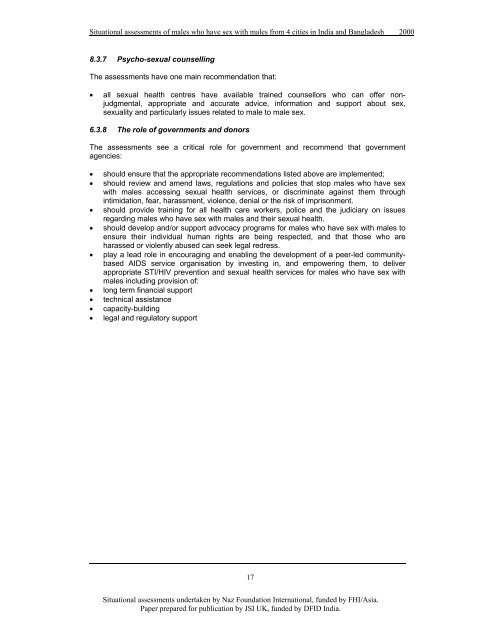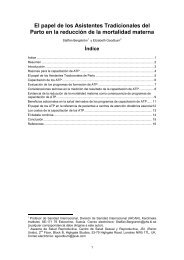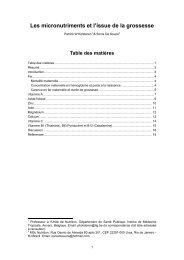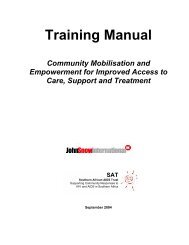Sexual Health of males in South Asia who have sex with other males
Sexual Health of males in South Asia who have sex with other males
Sexual Health of males in South Asia who have sex with other males
- No tags were found...
You also want an ePaper? Increase the reach of your titles
YUMPU automatically turns print PDFs into web optimized ePapers that Google loves.
Situational assessments <strong>of</strong> <strong>males</strong> <strong>who</strong> <strong>have</strong> <strong>sex</strong> <strong>with</strong> <strong>males</strong> from 4 cities <strong>in</strong> India and Bangladesh 20008.3.7 Psycho-<strong>sex</strong>ual counsell<strong>in</strong>gThe assessments <strong>have</strong> one ma<strong>in</strong> recommendation that:• all <strong>sex</strong>ual health centres <strong>have</strong> available tra<strong>in</strong>ed counsellors <strong>who</strong> can <strong>of</strong>fer nonjudgmental,appropriate and accurate advice, <strong>in</strong>formation and support about <strong>sex</strong>,<strong>sex</strong>uality and particularly issues related to male to male <strong>sex</strong>.6.3.8 The role <strong>of</strong> governments and donorsThe assessments see a critical role for government and recommend that governmentagencies:• should ensure that the appropriate recommendations listed above are implemented;• should review and amend laws, regulations and policies that stop <strong>males</strong> <strong>who</strong> <strong>have</strong> <strong>sex</strong><strong>with</strong> <strong>males</strong> access<strong>in</strong>g <strong>sex</strong>ual health services, or discrim<strong>in</strong>ate aga<strong>in</strong>st them through<strong>in</strong>timidation, fear, harassment, violence, denial or the risk <strong>of</strong> imprisonment.• should provide tra<strong>in</strong><strong>in</strong>g for all health care workers, police and the judiciary on issuesregard<strong>in</strong>g <strong>males</strong> <strong>who</strong> <strong>have</strong> <strong>sex</strong> <strong>with</strong> <strong>males</strong> and their <strong>sex</strong>ual health.• should develop and/or support advocacy programs for <strong>males</strong> <strong>who</strong> <strong>have</strong> <strong>sex</strong> <strong>with</strong> <strong>males</strong> toensure their <strong>in</strong>dividual human rights are be<strong>in</strong>g respected, and that those <strong>who</strong> areharassed or violently abused can seek legal redress.• play a lead role <strong>in</strong> encourag<strong>in</strong>g and enabl<strong>in</strong>g the development <strong>of</strong> a peer-led communitybasedAIDS service organisation by <strong>in</strong>vest<strong>in</strong>g <strong>in</strong>, and empower<strong>in</strong>g them, to deliverappropriate STI/HIV prevention and <strong>sex</strong>ual health services for <strong>males</strong> <strong>who</strong> <strong>have</strong> <strong>sex</strong> <strong>with</strong><strong>males</strong> <strong>in</strong>clud<strong>in</strong>g provision <strong>of</strong>:• long term f<strong>in</strong>ancial support• technical assistance• capacity-build<strong>in</strong>g• legal and regulatory support17Situational assessments undertaken by Naz Foundation International, funded by FHI/<strong>Asia</strong>.Paper prepared for publication by JSI UK, funded by DFID India.






